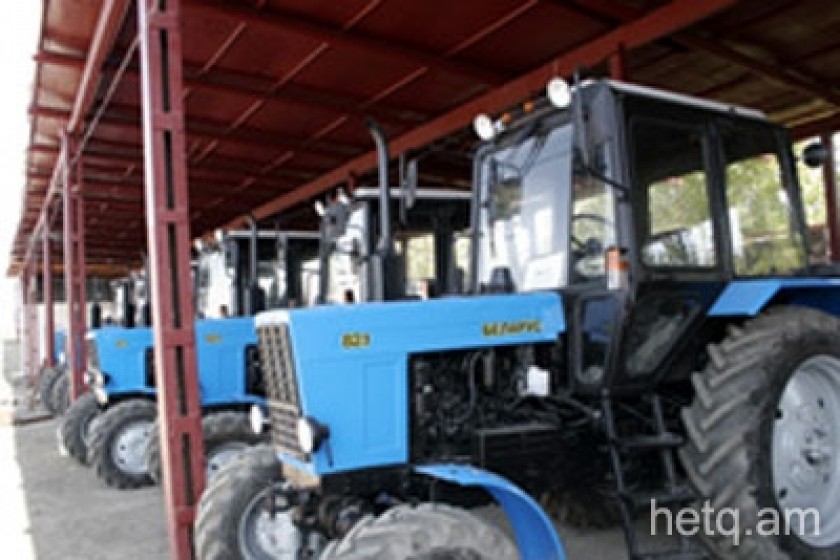
Unity is Strength
The 2005 Hayastan All-Armenian Armenia Fund telethon was dedicated in its entirety to the region of Martakert. This included, for the first time, an agricultural project aimed at the infrastructure development which is slowly becoming a reality. The project involves the establishment of a base of tractors and machinery serving Martakert and the eighteen communities surrounding it.
Valery Khachatryan, president of Agricultural Services CJSC, said that this program was intended to provide a helping hand to villagers who own land in the area. “These are people who own land but don't have the means to cultivate it.”
Agricultural Services received seven Belarus tractors from the Fund for the program. Plows, seed planters and trucks were brought from China. The base will soon have two combines as well. Overall, the fund has bought more than one million American dollars worth of machinery for the base.
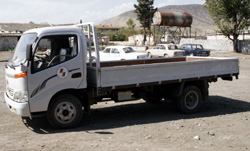 |
 |
 |
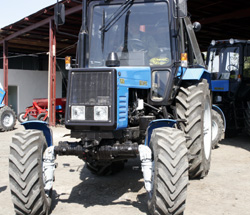 |
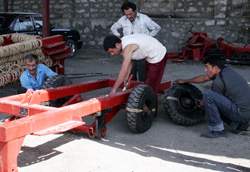 |
 |
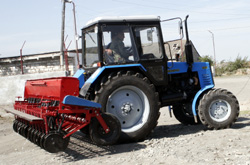 |
 |
“We will be able to plant and harvest around 3,000 hectares in eighteen villages,” said Gevorg Toroyan, head of the US East Coast branch of the Armenia Fund, “We will be able to help around 900 farmers, cultivators, and families who own land.”
The Martakert region, which at first glance seems to be a borderless stretch of fertile fields, consists in reality of pieces of land belonging to hundreds of families The establishment of this base has radically changed the situation here. Without it, each landowner would have had to handle all farming needs on his own.
Gevorg Toroyan said that the program aimed to unite the landowners in the villages. “We will help these 900 villagers to work together, because this unity will make things a lot easier for them. For example, if they want to buy seeds they will get a much cheaper price if all 900 buy them together, rather than if each farmer buys his seeds individually. This method – the cooperative method – has been tried everywhere. Unity is always strength.”
Specialists from the United States have been invited by the fund for technical consultations. Bill Price believed that replacing old, worn-out Soviet machinery with new equipment would make agriculture a lot more efficient. In his opinion, agriculture in Martakert is in catastrophic state not as much because of the war, but more due to the employment of faulty economic mechanisms left from the Soviet Union.
Relations between the base and the villagers of Martakert will be coordinated through the Farmers' Society, a newly established organization which will be the purchaser for the base's services. The Farmers' Society will sign a contract with Agricultural Services for each farmer on an individual basis. Valery Khachatryan, President of Agricultural Services, considered this the best way to provide the villagers with timely and inexpensive technical services.
This fall, planting in the Martakert region will be done using the new tractors supplied by the All-Armenia Fund. Vahram Baghdasaryan, the Nagorno Karabakh agriculture minister, said that the station where the tractors were parked – a mere project idea a year ago – was a source of enthusiasm for the people of Martakert today.
“Just a year ago, the details for this project were being worked out when a group of experts visited the region. Today, we are witnessing the start of this program.”
Gevorg Toroyan was also happy with the progress and results of the program.
“Naturally, when the donors see that their money has been transformed into work they will be very happy. They will be delighted to see that the tractors have started tilling the soil.” In his opinion, this program has changed the strategy of the philanthropy seen so far.
“The Fund is the first and only organization that has been doing this for all sectors of all the villages – meaning tending to economic and other needs. I don't think we can develop the villages without first establishing an economic basis for their progress. If we don't create jobs for the villagers and increase their productivity, it won't be as helpful to construct houses or build a school. But if we create jobs and develop the economy then people will have more money. Then, if we don't construct houses – they will, if we don't build a school for them – they will do it themselves.”
This agricultural program in Martakert is the first of its kind, but it is already clear that it will be enough to cover the needs of landowners in these villages and there should be no problem in implementing such a program in the region of Hadrut next year.
 Videos
Videos Photos
Photos




Write a comment